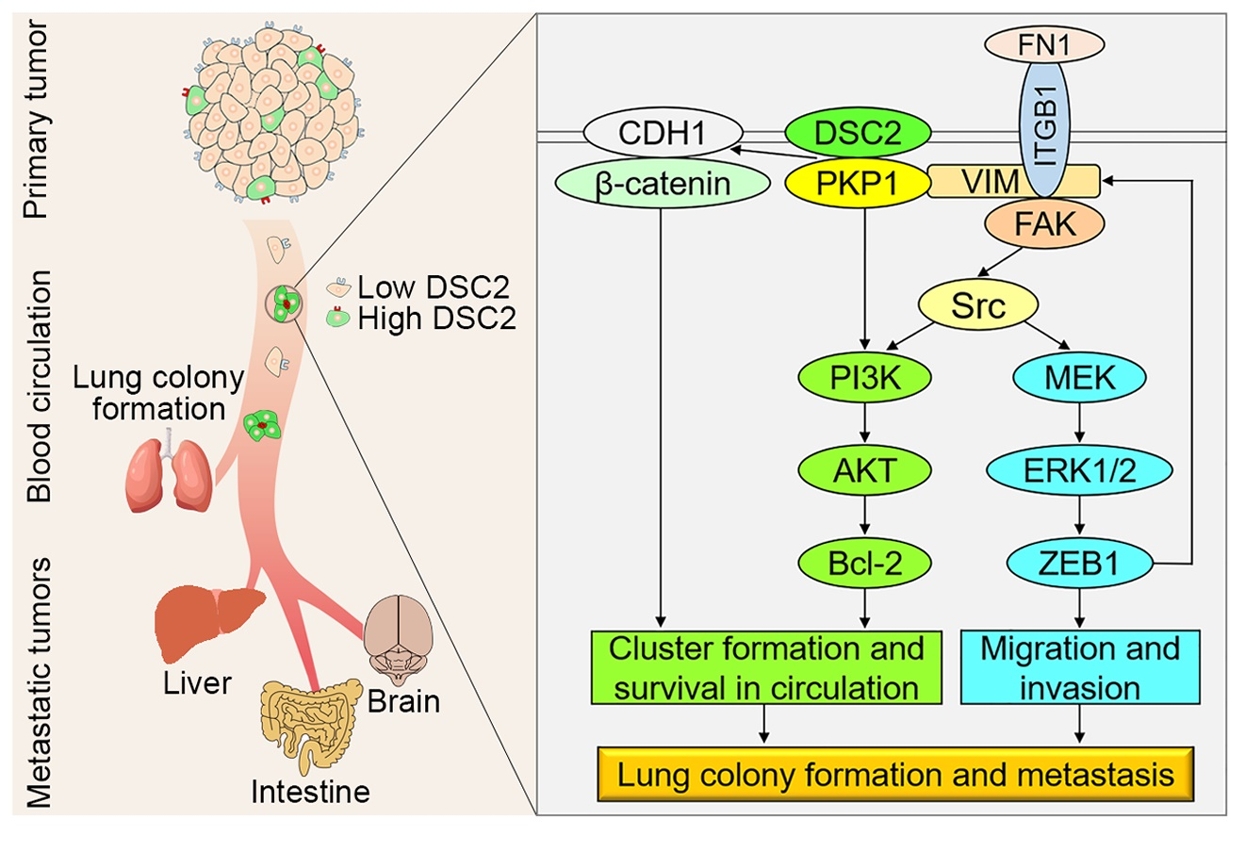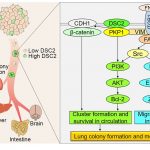 Mechanism and signal pathways through which DSC2/PKP1 and VIM support cluster formation, cell survival in circulation, lung colony formation, and metastasis.
Mechanism and signal pathways through which DSC2/PKP1 and VIM support cluster formation, cell survival in circulation, lung colony formation, and metastasis.
A research team led by Prof Kathy Luo Qian in the University of Macau (UM) Faculty of Health Sciences (FHS) has found that tumour cells can express more desmosomal proteins of desmocollin-2 (DSC2) and plakophilin-1 (PKP1) to help them form cell clusters in the circulatory system, so that circulating tumour cells can survive in the blood stream and have a stronger metastatic ability. This discovery provides new insights into how circulating tumour cells survive in the circulatory system, which may help to develop new anti-metastasis therapies. The study has been published in the internationally renowned journal Science Advances.
When tumour cells enter the blood stream, most of them will die in the circulation, and if those that survive can successfully form metastases, they will cause more than 90 per cent of cancer patients to die. Therefore, exploring how tumour cells survive in blood circulation and form metastases is essential for the development of new anti-metastasis therapies.
In the study, UM researchers developed a microfluidic circulation system to isolate breast cancer and lung cancer cells that could resist fluid shear stress. They found that these shear stress-resistant cells showed higher abilities to form clusters, to survive in circulation, and to form metastases in mice. They also found that these shear stress-resistant cells expressed between four and five times more desmocollin-2 (DSC2) and plakophilin-1 (PKP1) proteins. Further analyses showed that high expression of both DSC2 and PKP1 not only facilitated cancer cells to form clusters in circulation; they also activated the PI3K/AKT/Bcl-2-mediated pathway to increase cell survival. High levels of DSC2 and PKP1 are also important for maintaining a high expression level of vimentin, which stimulates fibronectin/integrin β1/FAK/Src/MEK/ERK/ ZEB1-mediated metastasis. Moreover, higher levels of DSC2 and PKP1 were detected in tumour samples from patients with breast and lung cancer, and their high expression was correlated with lower overall survival rate and worse disease prognosis. For this reason, DSC2 and PKP1 may serve as new biomarkers for detecting and targeting metastatic circulating tumour cells.
The corresponding author of this study is Kathy Luo Qian, and her PhD student Li Koukou is the first author. Three other PhD students, namely Wu Renfei, Zhou Muya, and Tong Haibo also made important contributions to this study. This project is supported by UM’s research fund (file number: MYRG2018-00092-FHS) and Ministry of Education Frontiers Science Center for Precision Oncology, University of Macau (file number: FSC-2021). The full text of the research article can be viewed at: https://www.science.org/doi/10.1126/sciadv.abg7265



